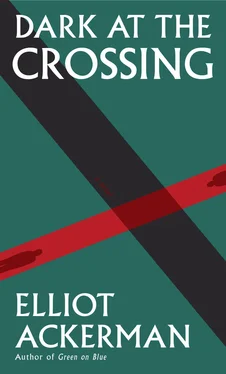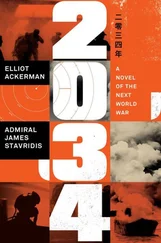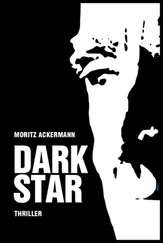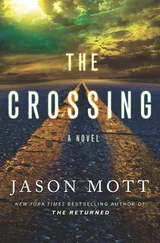Stealing glances at the analog game clock, a thrift store piece of junk, Amir watched its second hand sweep toward victory if he could only hold on. The three forwards charged, passing the puck quickly between their sticks. Each time the puck moved, Amir adjusted himself on his skates, wobbling a little. It had been nearly six months since Daphne and Haris had disappeared, not nearly enough time to become a proficient goalie. Still, he’d managed to do a good enough job so the Minutemen made the finals, beating out four other teams. And since Amir had agreed to play in the league, and since they’d begun to win, Marty no longer asked about the five thousand he owed for the report Daphne never delivered.
The forward who advanced down the right wing cut to center, heading directly at the goal. Amir bit his skates into the ice, planting himself in a crouch so he could spring toward the shot. Then, at the final moment, the forward passed the puck to his teammate on the left wing. Amir saw that he’d been duped, but his body couldn’t react fast enough. The shot came from the opposite direction. It sailed toward the open left side of the net while Amir collapsed toward the right, blocking in the wrong direction. He anticipated the cheers from the opposing team, but instead of cheers he heard the hollow metallic tang of the puck striking the goal’s crossbar.
Amir sprung back to his feet. Searching for the puck, his gaze met Marty’s wide, panicked eyes farther up the ice. The three forwards emerged again, sweeping from behind the goal and passing the puck quickly among them. Less than ten seconds of play remained. This would be their last chance. And with the desperation of a last chance they came at Amir, shoulders down, in a line. Amir struggled to keep sight of the puck. Then he lost track of it altogether. The three forwards converged on him at once. Unable to see where they might shoot from, Amir had to protect the whole goal. He spread his body wide, throwing it in front of the forwards, who fell upon him with hacking sticks. The last play of the game now devolved into a scrum over Amir’s body. Marty and the rest of the Minutemen joined the fray, also chopping away at Amir, trying to get the puck. Of all the players on the ice, Amir was the only one who didn’t care about the puck. All he cared about was protecting the goal. He lay on his side, flailing his legs and arms up at any empty space. At last, a whistle blew.
End of game.
One by one the forwards and defensemen of both teams peeled away from the goal. Each side was uncertain about the outcome. They glanced into the net, but couldn’t tell if anyone had scored. Then, slowly, Amir stood, checking himself. As he came to his feet, the puck dropped from where it’d been buried in the pads around his ribs.
0–1, Minutemen.
Marty leapt down the ice, pumping his knees and fists in the air. He came to rink-side and picked up the silver goblet, holding it triumphantly above his head, kissing it. The rest of the team joined him, except for Amir.
A knot of spectators had formed around the rink boards. Amir pressed through them, slowly skating from the ice. He sat on a bench just to the side, peeling off his pads, a jumble of secondhand and thirdhand equipment Marty had scrounged. While all attention was paid to the Minutemen’s victory, a boy with a missing leg and mismeasured prosthesis hobbled over with the help of a cane. In one hand he carried a plastic bag, which seemed too heavy for him.
“You are Amir Khalifa?” he asked.
“Who wants to know?” Amir barely glanced back. He’d just managed to slide his thick padded blocker off his left hand, and he worked to unbuckle the catcher from his right.
“My friend Jamil asked that I deliver something to you.”
Amir jerked his head up. A wispy beard grew from the boy’s cheeks in patches, and it would still be some years until he could grow a full one. His eyes were sallow, as if stained by a long sickness. Jamil’s friend looked like a tired, worn-out version of Jamil.
The boy offered the plastic bag he carried.
“Where’s Jamil?”
“I last saw him along Aleppo’s southern front,” said the boy. “When they took me to the hospital here, he gave me this for you.” He held the bag out again.
As soon as Amir felt its weight, he knew what it was.
He pulled out Saied’s old Nokia and a thick volume, bound in blue leather. Quickly he opened the journal, its spine creaking. Page after page of Daphne’s scrawling handwriting stared back. Amir began to check each one, looking for some clue of what had happened to her and Haris.
Before he could finish, the boy turned his back to Amir, staggering through the spectators, who still celebrated Marty’s triumph. “Where are you going?” Amir called out. The boy ignored him and continued to walk down the marble corridors of Sanko Park, headed for the exit. Amir quickly took off his leg pads and skates. He slid on his shoes, but within moments he’d lost the boy among the crowded shopfronts.
By the time Amir returned to the rink, the celebration had ended. Marty was packing up the last of his equipment. “I’ve invited everyone over to the office in about an hour,” he said.
Amir nodded.
“You are coming?”
Amir shouldered his heavy sports bag and clutched the plastic bag he’d been given. He wanted to find a quiet place to sort through the journal and Nokia.
“C’mon,” said Marty. “It won’t be a party without you.”
Amir shrugged and walked out the mall’s front, toward the parking garage.
“I’ll see you soon!” Marty called after him.
Belowground in the garage, Amir loaded all of his things except for the plastic bag into the trunk of the black Peugeot. He wedged himself behind the driver’s seat and, turning on the overhead light, he spread the bag’s contents on his lap. Carefully, he thumbed through the journal. Each page had been filled, except for a final few, which had been left blank. Scribbled in an uneducated hand along the top margin of the last one was a note:
Daphne and Haris. N of Aleppo.
Rte 214. By school. Under elm.
Amir reached for the Nokia, powering it on. Saved to its background was a photograph. The squat cinder-block house with its empty windows and door sat in a dry, rutted field. The sky was very blue. Framed against it, in the center of the photo, was the elm, its branches bare and gray, yet to green. At the base of the tree, where its roots clutched at the earth, a single thick tuft of barley grew. Its long feathered stalks bent heavily in the wind, a strange and stubborn crop it seemed.
Amir powered down the Nokia, placing it on the seat next to him.
He couldn’t just leave them there, but he didn’t know what he should do.
He wandered out of the parking garage and into the day. It was warm. Spring had arrived early this year, and in front of him the trees in Antep City Park had begun to leaf. He had nowhere to be. So he decided to take a long walk home beneath their shade.
My gratitude to Matt Trevithick and Daniel Seckman for making their duo in Gaziantep a trio, to my mother who is my first and most generous reader, to Lea Carpenter for her inexhaustible belief, to PJ Mark for being the finest champion and the finest friend, to Marya Spence for her keen insights, and to my pal Diana Tejerina Miller, whose energies and talent made this book better. I am also indebted to my children, Coco and Ethan, who with fearless hearts took this journey with me.
ELLIOT ACKERMAN, author of the critically acclaimed novel Green on Blue, is based out of Istanbul, where he has covered the Syrian Civil War since 2013. His writings have appeared in The New Yorker, The Atlantic, The New Republic and The New York Times Magazine, among other publications, and his stories have been included in The Best American Short Stories. He is both a former White House Fellow and a Marine, and has served five tours of duty in Iraq and Afghanistan, where he received the Silver Star, the Bronze Star for Valor and the Purple Heart.
Читать дальше












